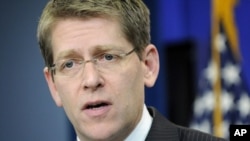A day before President Obama is expected to speak publicly about the situation in Libya, his spokesman says the United States and its international partners continue to keep all options on the table to deal with the situation.
With Libyan leader Moammar Gadhafi defying calls to step down, and his forces increasing attacks on opposition fighters, the U.S. and its partners are under increasing pressure to establish a no-fly zone over Libya.
The importance of this issue was highlighted after reports that Libyan government aircraft carried out strikes on one town between Brega, an oil refining center, and the second largest city, Benghazi, which is controlled by insurgents.
President Obama's spokesman, Jay Carney, repeated what he has been telling reporters through the week, that a no-fly zone is among options being "actively considered."
He had this response when pressed Wednesday about remarks by Defense Secretary Robert Gates in testimony on Capitol Hill that establishing a no-fly zone would be a "big operation" and would require military strikes against Libyan air defenses.
"Other options remain on the table, "said Carney. "The fact that the no-fly zone idea is complex does not mean it is not on the table, so there is not a contradiction between what Secretary Clinton said and what Secretary Gates said."
Asked whether the White House has gotten resistance from Secretary Gates or military leaders on the option of a no-fly zone, Carney replied "not at all." He added that the administration as of mid-Wednesday had no announcements about options that may or may not be taken.
On other issues, the White House issued a statement on Wednesday detailing a phone call from Yemen's President Ali Abdullah Saleh in which the Yemeni leader apologized for any "misunderstanding" caused by comments he made earlier.
In remarks at Sana'a University Tuesday, President Saleh said the U.S. and Israel were responsible for the wave of protests in the region, and he directly accused President Obama of meddling in the affairs of Arab countries.
In a phone call with President Obama's counter-terrorism adviser John Brennan, President Saleh said, according to the White House, that he is "firmly committed to meaningful political reform in Yemen, and is reaching out to opposition elements in an effort to achieve reform through a democratic, inclusive and peaceful process."
Brennan, according to the statement, said any comments seeking to "attribute blame for recent developments in the region are unhelpful as they ignore the legitimate aspirations of people in the Arab world.
At the White House news briefing, Press Secretary Jay Carney also was asked about the level of concern about Yemen, and about a statement by Yemeni cleric Abdul Majid al-Zindani, who called for creation of an Islamic state in Yemen.
By and large, Carney said, demonstrations by Yemenis, as with those in other countries in the region, are broad-based and focused on democratic reforms.
"That one man has called for the kind of change that he is calling for is not necessarily reflective of the change that Yemenis more broadly are demanding," he said.
President Obama is expected to make remarks about Libya, and likely on the situations in other countries in the region, on Thursday, as he meets with visiting Mexican President Felipe Calderon.
White House: All Options Considered on Libya, Yemen
- By Dan Robinson















